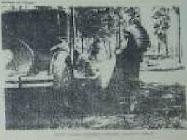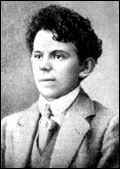One of the special perks of the official Poetic License is the freedom to balance two contradictory ideas without falling off the tightrope, or at least not quite. Sailing with Keats's "negative capability", or Whitman's "I contradict myself..." (however it goes).
My previous entry on this thread (JT #21) was a cautious rumination on the nature of the Trinity, and our names for same - speculations around the idea that God perhaps transcends our gender terms, like "Father" and "Son". As St. Paul put it, "in Christ is neither male nor female..."
Today I'd like to look at this from the opposite angle. If we believe God is (as explored in previous entries here) the substantial, cosmic Personhood - and Persons-in-relation, in comparison with which our own partial sense of personhood is only a foretaste - then, undoubtedly, this divine Person is not only capable of transcending or fusing gender differences, but also capable of representing substantial qualities of each gender as integral aspects of personhood.
Why do I think this is important to remember? Because when I read the Bible - from beginning to end, Old Testament and New - I am struck by the deep and continuous focus on what it means to be a righteous person : the essential theme of human edification. God is good, God is holy, and he exhorts and demands goodness and righteousness from his chosen children.
The fact that this theme is couched in overwhelmingly "masculine" images and episodes of power, leadership, and force - Yahweh is above all other gods, Yahweh will throw down all other gods, Yahweh will punish the wicked kings and nations who oppress the earth : Yahweh will save, lift up, reward the righteous man - is in part due to the dialectical challenge which Hebrew religion was offering to the world-age of political and social violence and oppression in which this testimony appeared (on this, by all means see Herbert Schneidau's classic study : Sacred Discontent).
I link this dimension up with some key statements or parables of Jesus, such as when he states that "from the days of John until now, the kingdom of heaven has come by violence, and men of violence take it by force" : or the parable about the kingdom being likened to "tying up the strong man" who is robbing the house. The whole Biblical ethos can be understood as "tying up the strong man" - reining in the violent appetites & the turn to violence practiced in all cultures - offering a new ethos (humility; kindness; wisdom; peace-making).
The fact that this alternative ethos might be seen as rooted in traditional "feminine" aspects - gentleness, mercy, a nurturing care for the poor and the weak - is worth a very profound exploration. It should be approached with great care and circumspection, however : keeping in mind our tendency to project our own values anachronistically onto other times & places. "Masculine" domination and "feminine" gentleness - in the sphere of theology & the characterization of God - is a very complex & shifting gray area....
12.03.2012
Subscribe to:
Post Comments (Atom)



No comments:
Post a Comment